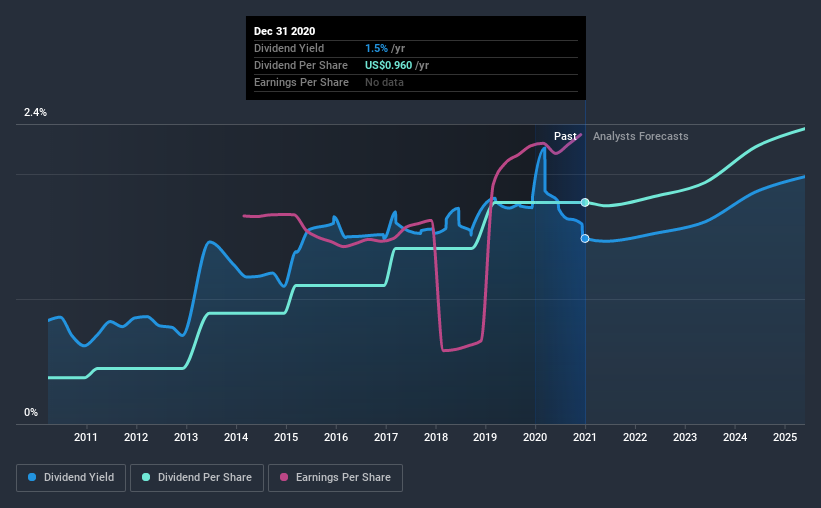Should You Buy Oracle Corporation (NYSE:ORCL) For Its Upcoming Dividend?
Some investors rely on dividends for growing their wealth, and if you're one of those dividend sleuths, you might be intrigued to know that Oracle Corporation (NYSE:ORCL) is about to go ex-dividend in just 4 days. Investors can purchase shares before the 6th of January in order to be eligible for this dividend, which will be paid on the 21st of January.
Oracle's next dividend payment will be US$0.24 per share, on the back of last year when the company paid a total of US$0.96 to shareholders. Last year's total dividend payments show that Oracle has a trailing yield of 1.5% on the current share price of $64.69. We love seeing companies pay a dividend, but it's also important to be sure that laying the golden eggs isn't going to kill our golden goose! So we need to investigate whether Oracle can afford its dividend, and if the dividend could grow.
Check out our latest analysis for Oracle
If a company pays out more in dividends than it earned, then the dividend might become unsustainable - hardly an ideal situation. That's why it's good to see Oracle paying out a modest 28% of its earnings. Yet cash flow is typically more important than profit for assessing dividend sustainability, so we should always check if the company generated enough cash to afford its dividend. What's good is that dividends were well covered by free cash flow, with the company paying out 24% of its cash flow last year.
It's positive to see that Oracle's dividend is covered by both profits and cash flow, since this is generally a sign that the dividend is sustainable, and a lower payout ratio usually suggests a greater margin of safety before the dividend gets cut.
Click here to see the company's payout ratio, plus analyst estimates of its future dividends.
Have Earnings And Dividends Been Growing?
Stocks in companies that generate sustainable earnings growth often make the best dividend prospects, as it is easier to lift the dividend when earnings are rising. Investors love dividends, so if earnings fall and the dividend is reduced, expect a stock to be sold off heavily at the same time. This is why it's a relief to see Oracle earnings per share are up 8.4% per annum over the last five years. Management have been reinvested more than half of the company's earnings within the business, and the company has been able to grow earnings with this retained capital. Organisations that reinvest heavily in themselves typically get stronger over time, which can bring attractive benefits such as stronger earnings and dividends.
Many investors will assess a company's dividend performance by evaluating how much the dividend payments have changed over time. In the last 10 years, Oracle has lifted its dividend by approximately 17% a year on average. We're glad to see dividends rising alongside earnings over a number of years, which may be a sign the company intends to share the growth with shareholders.
To Sum It Up
Has Oracle got what it takes to maintain its dividend payments? Earnings per share have been growing moderately, and Oracle is paying out less than half its earnings and cash flow as dividends, which is an attractive combination as it suggests the company is investing in growth. We would prefer to see earnings growing faster, but the best dividend stocks over the long term typically combine significant earnings per share growth with a low payout ratio, and Oracle is halfway there. Overall we think this is an attractive combination and worthy of further research.
In light of that, while Oracle has an appealing dividend, it's worth knowing the risks involved with this stock. Case in point: We've spotted 1 warning sign for Oracle you should be aware of.
We wouldn't recommend just buying the first dividend stock you see, though. Here's a list of interesting dividend stocks with a greater than 2% yield and an upcoming dividend.
This article by Simply Wall St is general in nature. It does not constitute a recommendation to buy or sell any stock, and does not take account of your objectives, or your financial situation. We aim to bring you long-term focused analysis driven by fundamental data. Note that our analysis may not factor in the latest price-sensitive company announcements or qualitative material. Simply Wall St has no position in any stocks mentioned.
Have feedback on this article? Concerned about the content? Get in touch with us directly. Alternatively, email editorial-team (at) simplywallst.com.

